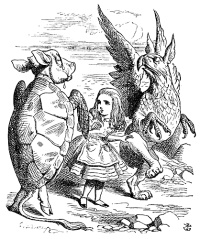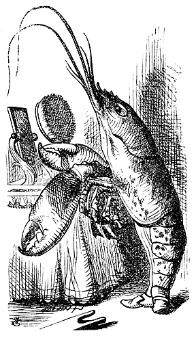The Lobster Quadrille
Studies in Alice X, by Marc Edmund Jones This lesson considers the tenth chapter of Alice
in Wonderland and the tenth great principle of
wisdom in the Philosophy of Concepts as
revealed through the adventures of Alice is that
life is cumulative and recapitulatory or that no
cycle is ever lived out and no experience is ever
surrendered or dropped from consciousness
until such time as the period of disintegration or
decay begins. Thus many individuals begin to
die before they are well into the years of adult-ship and in the detail of healing and life
counseling that is the most important part of any
laboratory work with the soul of man and as is
represented in the development of this
Philosophy of Concepts the greatest single
difficulty is that in practically every case this
underlying or subtle death has begun. Before
more than the most superficial palliation in
healing can be given, whether the problems are
of body or pocket book or emotional
complication, the individual must first be rescued from the almost unbreakable grip of this death.
The healing procedure is simple enough in principle but is desperately difficult in practice. It is
necessary that every thread of life be caught up, repaired and placed strongly and firmly again in
and through the heavier or outer warp threads of the fabric of life until the very pattern of the
soul itself is revealed to the eyes of the world. Life is life and the basis of real living is
utilization to the full of every element in the experience. A frugal nature punishes bitterly those
who by surface observation alone assume her to be prodigal, and ape her as they may feel
subconsciously, by carelessly scattering abroad the very substance of self. At each stage of
growth man must pick up all the shreds of his life. The process, seen in natural form as it goes
to seed in the memories and wanderings of old age, is intensified by philosophical study and so
philosophy becomes in truth the hope of the world today.
This lesson considers the tenth chapter of Alice
in Wonderland and the tenth great principle of
wisdom in the Philosophy of Concepts as
revealed through the adventures of Alice is that
life is cumulative and recapitulatory or that no
cycle is ever lived out and no experience is ever
surrendered or dropped from consciousness
until such time as the period of disintegration or
decay begins. Thus many individuals begin to
die before they are well into the years of adult-ship and in the detail of healing and life
counseling that is the most important part of any
laboratory work with the soul of man and as is
represented in the development of this
Philosophy of Concepts the greatest single
difficulty is that in practically every case this
underlying or subtle death has begun. Before
more than the most superficial palliation in
healing can be given, whether the problems are
of body or pocket book or emotional
complication, the individual must first be rescued from the almost unbreakable grip of this death.
The healing procedure is simple enough in principle but is desperately difficult in practice. It is
necessary that every thread of life be caught up, repaired and placed strongly and firmly again in
and through the heavier or outer warp threads of the fabric of life until the very pattern of the
soul itself is revealed to the eyes of the world. Life is life and the basis of real living is
utilization to the full of every element in the experience. A frugal nature punishes bitterly those
who by surface observation alone assume her to be prodigal, and ape her as they may feel
subconsciously, by carelessly scattering abroad the very substance of self. At each stage of
growth man must pick up all the shreds of his life. The process, seen in natural form as it goes
to seed in the memories and wanderings of old age, is intensified by philosophical study and so
philosophy becomes in truth the hope of the world today.
Here is the principle of karma as the occult term for the aggregated cause that inherent in self is conceived to be responsible for the effects manifest in the world as the surrounding circumstances of being. Karma ordinarily is taught in somewhat kindergarten fashion that the influences in the present life result from the acts, and mostly bad ones, of past lives. However, this doctrine of reincarnation complicates the doctrine of karma needlessly. Karma must be seen as the pattern of being or the actual warp of the fabric of soul. If karma were all worked out the individual would die. Apart from every other factor there would be nothing left that would be his I or ego. Only experience is eternal and immortal and the actual essence of experience is that for which the term karma serves best. Karma properly understood, instead of being worked out, is intensified with growth. Thus it is clear why in the Mysteries teaching it is said that at every initiation everyone must master their karma all over again. Every weft thread as the design of life increases in beauty of detail must still be woven on the underlying warp. The symbolism of the tenth chapter of Alice is therefore interesting in showing through the lobster the striking picturization of this divinely inspired and recurrent dip into the very depths of life. The lobster fundamentally is a scavenger, and in the proper constructive sense of the word spiritual man is a scavenger enabled to salvage and make useful every item of experience. In the large family of Crustacea to which the lobster belongs is found the only example of real blue blood because the chemical element of the oxygen-carrying function of the blood is copper instead of iron and in occult teachings the Venus copper is closer to the spiritual sun than the Mars iron. The lobsters are thrown into the sea during the game and the sea is eternally the great supporting body of all experience.
The achievement of imagination in the chapter, or the tenth great scientific achievement, is the revelation of the principles of psychology or the modern science of the analysis of action and reaction in human intelligence. While the psychology as known to the academicians of the twentieth century is yet in its first stages of development, with the science of mind considered a branch of metaphysics until the nineteenth century and given wholly into the hands of theorists, its achievements are great indeed. In general the modern psychologists, and the universities and educational institutions supporting them, have established to the scientific mind the fact that reality is inherent in the soul or the psyche of man and that sentient life and the whole problem of the intelligence of nature must be considered apart from the realm of inanimate and accurately measurable things. Association is seen by practically all researchers to be the basis of knowing or intelligence, and this fundamental tenet of the science is foreshadowed in amusing fashion by the odd logic of this book and of this chapter in particular. To cite one example, the use of whiting instead of blacking for sea boots is a marvelous conceit from a psychological standpoint. That the explanation for the name of the fish is foolish is beside the point. Psychology already has learned that a false reason can be as stimulating to thought as a real one, and this leads equally to understanding.
The symbolism of the quadrille and of all games for that
matter is unusually well brought out by the degree of
excitement pictured in the participants. Excitement is the
means utilized by nature for the etching of experience into
the  consciousness of the self. Here is the key to the
whole of sex psychology as the excitement culminates in
a moment of intensity that pervades the whole being and
dominates every other consideration for a brief instant.
Students of phallic symbolism have been able to trace
every manifestation of intelligence to sex. However,
instead of proving an underlying nastiness in sentient
being this merely shows that intensity of moment, for the
sake of etching of experience into the inner being, is the
cardinal purpose or objective of every natural action. All
is not sex. Sex is merely the most convenient example of
universal employment of this force of intensity. After the
throwing of the cognizing self or lobster into the sea or
experience, changing the facets of experience or partners
and at the moment of culmination changing the point of
view or turning somersault, man settles down in his
faculties or the animals and quietly demands recognition
of the higher side of being symbolized by Alice
throughout.
consciousness of the self. Here is the key to the
whole of sex psychology as the excitement culminates in
a moment of intensity that pervades the whole being and
dominates every other consideration for a brief instant.
Students of phallic symbolism have been able to trace
every manifestation of intelligence to sex. However,
instead of proving an underlying nastiness in sentient
being this merely shows that intensity of moment, for the
sake of etching of experience into the inner being, is the
cardinal purpose or objective of every natural action. All
is not sex. Sex is merely the most convenient example of
universal employment of this force of intensity. After the
throwing of the cognizing self or lobster into the sea or
experience, changing the facets of experience or partners
and at the moment of culmination changing the point of
view or turning somersault, man settles down in his
faculties or the animals and quietly demands recognition
of the higher side of being symbolized by Alice
throughout.
The law of applied psychology or the tenth big idea for the solution of personal problems is brought out here in the technique of inspiration. Alice felt sure her recitation would all come out wrong and yet went on. As any successful author can testify, a true story always takes itself in hand and goes as it pleases. Inspiration is an outbreathing of self and there must be an individual touch or individual appeal in all inspiring things. Here is the basis of a real Bohemia or an artistic or cultural group in which little oddities and eccentricities of life may have a sympathetic and proper setting. The student must learn to BE DIFFERENT if he does not wish to be engulfed in life or to be in trouble constantly. For success and happiness an aspirant must challenge life and be challenged by life. He dare not surrender to an absolute conformity that will truly cause him to cease to be.

Sabian.org





